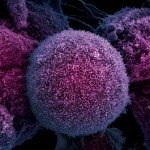Link to Pubmed [PMID] – 26292731
Nat Commun. 2015 Aug 21;6:8036
The generation of induced pluripotent stem cells (iPSC) from adult somatic cells is one of the most remarkable discoveries in recent decades. However, several works have reported evidence of genomic instability in iPSC, raising concerns on their biomedical use. The reasons behind the genomic instability observed in iPSC remain mostly unknown. Here we show that, similar to the phenomenon of oncogene-induced replication stress, the expression of reprogramming factors induces replication stress. Increasing the levels of the checkpoint kinase 1 (CHK1) reduces reprogramming-induced replication stress and increases the efficiency of iPSC generation. Similarly, nucleoside supplementation during reprogramming reduces the load of DNA damage and genomic rearrangements on iPSC. Our data reveal that lowering replication stress during reprogramming, genetically or chemically, provides a simple strategy to reduce genomic instability on mouse and human iPSC.


